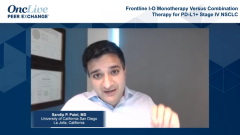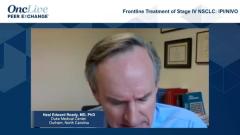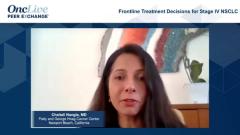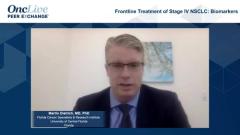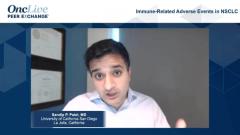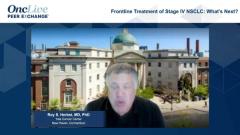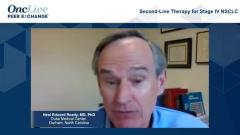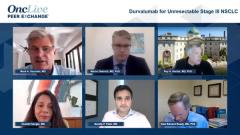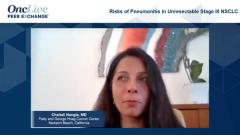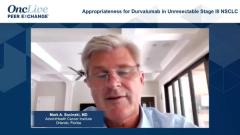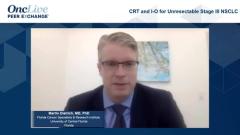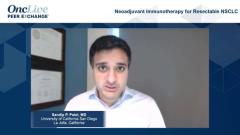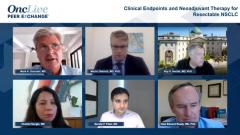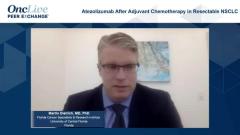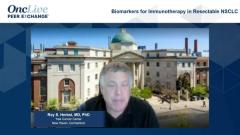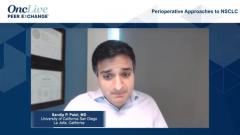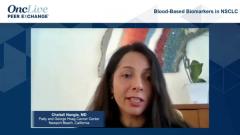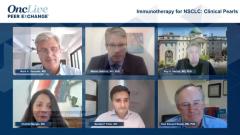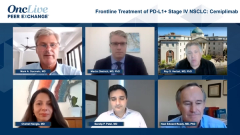
Appropriateness for Durvalumab in Unresectable Stage III NSCLC
Variables that influence patient selection for durvalumab consolidation after CRT as part of treatment for unresectable stage III non–small cell lung cancer.
Episodes in this series

Mark A. Socinski, MD: The other issue is how do you handle your borderline performance score patients? Because we know PACIFIC was PS-0 to one. We in practice know that we see a lot of PS-2 patients that is setting. Do you pursue the same strategy in this population, or does that make you pause?
Chaitali Nangia, MD: It does make me pause. There were at least 2 or 3 abstracts in 2021 looking at the elderly patients in single institution that did retrospective analysis for this elderly population, and they actually show that the same combinations the elderly patients did equally well but not such great performance status, so I think “Are all PS-2s equal?” Probably not but I do take it with a deep pause or am I going to do this for this patient, and then I have a low threshold if they start running into any issues.
Mark A. Socinski, MD: I think only 6% of the patients on the PACIFIC trial had EGFR mutations. How do you handle those? You're probably in an area where you probably see a lot of EGFR-mutant patients and so undoubtedly you have them. I have a recent case that I'll maybe bring up and see what the participants here would do but does that influence your thinking? Someone has an exon 19 deletion EGFR mutation.
Chaitali Nangia, MD: I think that's why the LAURA trial is going to be so instructive as to what to do with these people because there really is no clear guidance. Obviously, we saw from LAURA that unresectable situation, you will always start with a TKI [tyrosine kinase inhibitor], but here in an unresectable post to concurrent chemo radiotherapy [RT], there really is no diffraction. I do see way more EGFR and go through it now, but unless I have data to guide me through it, I stick with the Recofrac.
Mark A. Socinski, MD: I recently had a physician who has stage III, got chemo radiotherapy, and came to see me. She has an EGFR mutation and she's also a PDL-1 negative and she came to me and said, “Look in Europe, I couldn't get this. I'm not impressed with the data.” She was looking for Osimertinib as her consolidation therapy. I'll leave the story there and won't tell you what happened after that but certainly this is an issue to a well -educated EGFR mutation–positive patient, and again with so few patients in realizing that that EGFR-mutant population is not necessarily a population that gets a big bang from immuno monotherapy. I think it is a real issue in this population. I completely agree with you, I think LAURA is a very important trial and I have to believe since Rory told us in ADAURA, there was such a major benefit at least for DFS [disease-free survival] that it's hard for me to believe that we won't see the same thing in LAURA in the stage III population.
Chaitali Nangia, MD: Correct.
Mark A. Socinski, MD: How do you handle your progressors on durvalumab. Let me give you 2 examples: you’re 6 months into treatment with progression and then you're 1 year after completion of treatment. Those are 2 different ends of the spectrum. Your thoughts there?
Chaitali Nangia, MD: I guess when you start trying to understand the biologies, there's primary resistance, is this a quiet resistance, and I think as we get better in profiling these patients and understanding and having more trials the results will be fantastic. As of right now, 6 months into it I would kind of consider it more or less like a primary progression resistance and I go to chemo RT again. I'm not shy of using either docetaxel or docetaxel denosumab if this was in second line metastatic. In this case, that would become first line so I would just go to a platinum doublet. If it's more than 1 year out, then I might be tempted to use the IO [immuno-oncology] or IO combo again.
TRANSCRIPT EDITED FOR CLARITY


